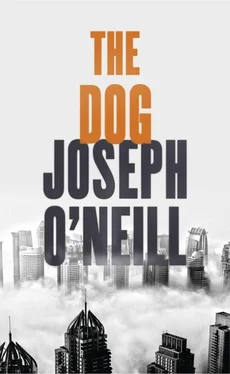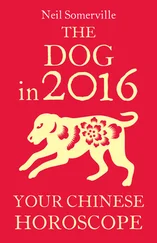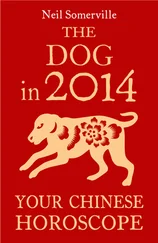Joseph O’Neill - The Dog
Здесь есть возможность читать онлайн «Joseph O’Neill - The Dog» — ознакомительный отрывок электронной книги совершенно бесплатно, а после прочтения отрывка купить полную версию. В некоторых случаях можно слушать аудио, скачать через торрент в формате fb2 и присутствует краткое содержание. Год выпуска: 2014, Издательство: HarperCollins Publishers, Жанр: Современная проза, на английском языке. Описание произведения, (предисловие) а так же отзывы посетителей доступны на портале библиотеки ЛибКат.
- Название:The Dog
- Автор:
- Издательство:HarperCollins Publishers
- Жанр:
- Год:2014
- ISBN:нет данных
- Рейтинг книги:4 / 5. Голосов: 1
-
Избранное:Добавить в избранное
- Отзывы:
-
Ваша оценка:
- 80
- 1
- 2
- 3
- 4
- 5
The Dog: краткое содержание, описание и аннотация
Предлагаем к чтению аннотацию, описание, краткое содержание или предисловие (зависит от того, что написал сам автор книги «The Dog»). Если вы не нашли необходимую информацию о книге — напишите в комментариях, мы постараемся отыскать её.
A funny and wholly original work of international literature,
is led by a brilliantly entertaining anti-hero. Imprisoned by his endless powers of reasoning, hemmed in by the ethical demands of globalized life, he is fatefully drawn towards the only logical response to our confounding epoch.
The Dog — читать онлайн ознакомительный отрывок
Ниже представлен текст книги, разбитый по страницам. Система сохранения места последней прочитанной страницы, позволяет с удобством читать онлайн бесплатно книгу «The Dog», без необходимости каждый раз заново искать на чём Вы остановились. Поставьте закладку, и сможете в любой момент перейти на страницу, на которой закончили чтение.
Интервал:
Закладка:
There was the famous time when, under the impression that I was getting what Ollie had termed ‘a really cutting-edge preventive ungual treatment’, I unwittingly allowed one of Ollie’s technicians to paint my toenails pink. When the lady technician removed the cucumber slices from my eyes and showed me her handiwork, I let out a shout of dismay that I immediately regretted because it seemed to upset the technician, who clearly was not in on the joke and plainly was worried that she’d done something wrong and was in big trouble. Ollie, of course, was laughing his head off.
This isn’t my favourite side of him. Our friendship was made underwater, where the scope for dicking around is zero. Quite frankly, I don’t share his taste for mischief and high jinks. One story he told about a night out in Moscow still haunts me. Evidently, Ollie emerged alone from a nightclub in the early hours. (What he was doing in a Moscow nightclub isn’t for me to understand or misunderstand.) There was fresh snow on the streets, and the snow in combination with the hour’s lateness and darkness had produced a vacant and hushed and newly ominous city — a city somehow connected to one’s childhood, if I may gloss the story. Ollie phoned for his car. He was waiting on the sidewalk when along came a horse, pale and jingling and clouded; and in the saddle was a beautiful young woman wearing a fur coat and a fur Cossack’s hat. As Ollie stood there, of course bewitched, a zooming BMW Z4 came down the street and, at a short distance beyond the horse, braked hard. The driver rolled down his window and leaned out to take a look at the horsewoman of mystery. As she drew level with the BMW, this man reached out of the car window and fired a pistol into the air. The horse skidded sideways, regained its balance, and bolted. The gunman sprang laughing out of the car, gun in hand. He hooted and slapped his thigh and jumped up and down as he watched the runaway going away with the woman hanging on for her life. Somehow she was not unseated; but the man slipped on ice and violently toppled backwards into the snow like a clown overthrown by a banana peel. This caused him to accidentally shoot. It didn’t put an end to his joy. Laughing more loudly than ever, he kicked his legs in the air and helplessly rolled and rolled in the snow.
Let’s acknowledge right away that Ollie played no part in what happened. He was an onlooker. What bothers me is that he didn’t tell his story as if he’d found himself in the wrong place at the wrong time, which is what I take to be the standard reaction of the eyewitness to a dangerous crime. To hear it from Ollie, he’d lucked into an amazing show. I accept that almost every element of the incident — Moscow, a make-believe night, a horse, gunfire, the randomness at the heart of everything — places what he saw beyond the frontier of the normal and invites a corresponding displacement of sensitivities. But it’s not obligatory to accept the invitation. I am the last person to propose an answer to the problem of determining what portion of the world may be treated as a pure amusement and what portion may not; I just know that I see nothing funny about a woman fighting for her life. And who can say if she succeeded? How do we know a car didn’t run her down? Isn’t it in any case certain that she was in terror? And even if one were to learn that she made it home safely and now viewed the episode as the most fun she ever had, Ollie’s story still cannot be removed from the complication of schadenfreude.
Oh, lighten up, for fuck’s sake, says a voice in my ear.
Fair enough. It’s very possible I’m being oversensitive — that I’m like those thin-skinned smoke detectors that screech at the presence of the slightest cooking fume and, if life is to go on, must be shut down.
When our homes were warm even when air-conditioned and Lynn and son and nanny in due course migrated north, Ollie dragged me out for a drink at Buddha-Bar. It’s in the Grosvenor House hotel, five minutes by taxi from The Situation, and so difficult for me to duck out of going to. The only time I’d been there, three sharp-looking anglophone businessmen, intently discussing what I took to be an important commercial opportunity, occupied the neighbouring table. When I eavesdropped, I learned that they were in a conversation about world travel in which they authoritatively misinformed one another about Minorca and Majorca. In this sense, I found Buddha-Bar unchanged. There was a supercar (a Lamborghini Gallardo) stationed at the hotel entrance; there was a velvet rope, to my mind an archaism of late-twentieth-century New York and its dream of VIPs and in-crowds; there was a pointlessly hushed ambiance; and, scattered in the calculated gloom, there was a clientele of very made-up and dressed-up older British tourists who looked as if they actually believed that they’d passed a test of selectness and, when I entered, stared intently at me as if I might turn out to be Hulk Hogan or Henry Kissinger.
And there was Ollie, signalling to me from a shadowy booth. A blonde woman was with him, and I realized right away that he’d sprung another one of his little surprises — a blind date. When I drew closer, I saw that my date wasn’t as blind as I’d thought, indeed wasn’t my date. She was Mrs Ted Wilson.
What happened next is inexplicably preceded, in my mind, by what happened one evening years ago, in Union Square, New York, when Jenn and I were walking home from the movies. We became separated in the crowd. I stopped on the busy sidewalk and turned with an extended left hand and said, I’m over here, darling, and reached for her. Instead of Jenn I found myself eye to eye with a beautiful dark-haired woman in her early thirties, herself holding the hand of a man not at all amused by the accidental offer to his girlfriend of another man’s hand. The couple moved on; Jenn, I’m assuming, took my hand for a little while. Whatever the exact nature of our physical contact, I walked next to her in surreptitious anguish, because in that instant of misidentification a fantasy of distressing power and implication had been released — in which the dark-haired beauty drops the hand of her boyfriend and takes my hand with a smile, and together we stroll into a Union Square filled, as always on summer evenings, with young romancing couples, and we walk on through a steaming urban night, laughing and talking as everything and everyone converts into lights and vapour; and we, my dark-haired woman friend and I, jump into an old but reliable jalopy and drive out across George Washington Bridge, and drive and drive into the green deep of the continent, an adventure of gas-station snacks and motel sex and maxed-out credit cards, driving onward through forests and farmland until, on a remote highway that pursues a twisting river — in Montana, maybe, or Durango, or Manitoba — a small, solid town catches us, and we stop there, and we take refreshments in a friendly little coffee shop, and we spontaneously begin our lives again for good there, among good neighbours. We befriend the lonely, pretty doctor and the gentle judge. We hold small, rewarding jobs, and we make two clever girls who hopscotch in the springtime. I have always wanted daughters. A chronicle of my awareness of my unhappiness would start with this banal, upsetting daydream, which, as I say, serves as a prologue to that moment in Buddha-Bar, when it was too late to make a run for it and there was nothing to be done except to stand there and wait for the unfortunate Mrs Ted Wilson to be, entirely reasonably, not nice to me.
Ollie made the introductions — and she didn’t recognize me!
My first thought was that this was more trickery — that they had conferred about the lentil-throwing incident and decided that to leave me like this, in a suspenseful limbo of non-identification, would be a fitting comic punishment. Then, as the two of them continued with their discussion — I’d taken a seat next to Ollie and was sort of trying to hide behind him — it became clear that my presence wasn’t a source of disturbance, or even of interest. This permitted me to conclude that, amazingly, who I was had not registered with Mrs Ted Wilson; and when I paid attention to what they were talking about and understood that Ollie was sympathizing with her about her traumatic discovery, apparently made only a day or two before, that the rumours were true and there was indeed a second, Dubai-based Mrs Ted Wilson (who was herself searching for Ted), I guessed that this Mrs Ted Wilson was in that state of perceptual impairment that I personally know to be a symptom of vital confusion and distress. In those first several months of the Jenn — me split, more than once I stepped off a subway train at a perfectly familiar station only to find myself at a loss as to where I was, a lostness referable in part to my temporary insanity, in part to the real-world derangement that had placed me not only in an unforeseen Lincoln Tunnel luxury rental but in a life populated by a new and unwelcome dramatis personae, chief among them oneself. I am certain that Mrs Ted Wilson must at some point that evening have asked herself, What am I doing here? Who the hell are these guys? How did it come to this?
Читать дальшеИнтервал:
Закладка:
Похожие книги на «The Dog»
Представляем Вашему вниманию похожие книги на «The Dog» списком для выбора. Мы отобрали схожую по названию и смыслу литературу в надежде предоставить читателям больше вариантов отыскать новые, интересные, ещё непрочитанные произведения.
Обсуждение, отзывы о книге «The Dog» и просто собственные мнения читателей. Оставьте ваши комментарии, напишите, что Вы думаете о произведении, его смысле или главных героях. Укажите что конкретно понравилось, а что нет, и почему Вы так считаете.












